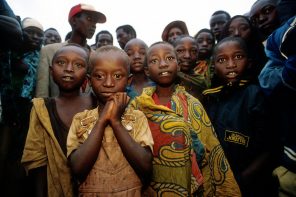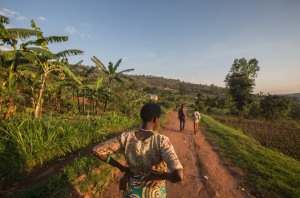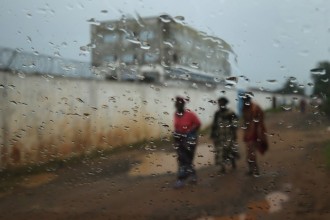Update, after I got out from under my rock
In one of the very active comments sections on the blogs that have taken this up, someone accused Nick Kristof of living under a rock. Accused is a strong word. ‘Asked if he did’ is better.
I have been the cyber equivalent of living under a rock, as a non-NGO affiliated person in the Central African Republic, where if you didn’t bring your own infrastructure like a satellite to connect to the Internet with, you have very little of it. So I missed most of the debate.
I’ve read some of it now, and I have three observations:
1. It’s really, really easy to bash Kristof. I’m not sure how much longer that game will be interesting.
2. I’m also not sure he deserves it this time.* (that * is important)
3. But with the tone he takes, he sure does make it hard to advocate for his content.
I find Kristof’s column at its most unctuous precisely where he is pretending not to be, and that tells you everything you need to know about the tone. Let’s agree to hate that.
But I think the content needs to be advocated for. There’s a knee-jerk discomfort with the one-sentence reduction that is his column: “African men (mostly) drink copiously and selfishly.” (I’d say it’s unfair to treat the text in reduction, but even I’m not going to say Kristof doesn’t do that most of the time, so we might as well deal it back to him.)
This is where the * comes in: Lots of people have pointed out in various comments sections that, whatever the reasons for the drinking, booze is a problem in a lot of Africa. And a lot of the world, of course.
Yes, it’s an uncomfortable observation. Sure, it would be great if it were made with data. But here’s what interests me: Why is it so wrong, so neo-colonialist, so anti-poor, so 19th-century, so indulgent of insert-stereotype-of-dumb-white-man-in-Africa-here to say, “Many men in Africa drink, sometimes at the expense of their families” — especially when we have meanwhile made peace with saying, “Many men in Africa beat their wives?”
Well, by “we’ve made peace with” I mean, “Domestic violence is on the NGO agenda.” In every African country I’ve been to in the last year — that’s five, two in West Africa and three in Central Africa — domestic violence is part of at least one, if not more, NGO programs. Often they’re international NGOs, sometimes they’re locals, sometimes partnerships.
I recognize an NGO agenda is not the end-all barometer of what we decide is okay to say and what’s not; I also recognize that the “we” here objectifies Africa and puts the West in the seat of judge. All of those are problems, but of a different sort and for a different argument.
So why can we recognize the unpleasant truth that there is a lot of domestic violence in Africa — we’re even coming close to recognizing that there is a lot of peacetime rape in Africa — but we have such trouble acknowledging that there’s also high alcohol consumption? Is it because Kristof created an artificial trade off, beer or school? Is it because that trade-off may not be so artificial, and that makes us nervous? Is it something else?
While we’re on it: Loved Amanda’s willingness at Wronging Rights to dig into the survey data Kristof cites. But I think there’s a danger in her refutation that echoes her criticism: “So, not so much the “ubiquitous problem” Kristof describes, then: most poor parents are sending their children to school, and the low education expenditure is at least partly a good sign, because it’s the result of free or heavily-subsidized primary education.”
Of the 13 studies in the sample that led to this conclusion, only three are from Africa. And, alas, I don’t think you can get away with best-guessing that “if the schools there do all charge fees, as Kristof claims, then the more reasonable inference to draw would be that spending on primary education there is probably higher than the 2% average, and closer to the 6% observed in Cote D’Ivoire and Indonesia.” Without data that suggest the countries in question are otherwise similar to Cote d’Ivoire and Indonesia, and if we’re playing by the same rules we’re asking Kristof to hold to, I don’t think that’s a fair inference.
There’s some discussion, in the study and by Amanda, about the quality of education relative to a parent’s willingness to pay for it. I’m not sure that the quality of the education is really the point here. If it were, the argument would go like this: “Parents are willing to pay for a good education. If the education is poor, they stop paying for it. If we put payment or nonpayment in terms of booze, that means parents are willing not to drink if their kids get a good education but say, ‘Screw it, hand me the bottle,’ if they think the education is bad.” My personal hunch, which comes only from drinking in Africa — but drinking in nine countries in Africa — is that drinking habits here, as elsewhere, are not that elastic.
The debate I’ve read through has reinforced my earlier questions: How can we talk about this problem? My own view at the moment is that debating the moral merits of asking the question in the first place isn’t going to get us very far.
—
Old post, written from under the rock
A friend sent me Nick Kristof’s column on “the ugly secret of global poverty, one rarely acknowledged by aid groups or U.N. reports….[one] that is politically incorrect, heartbreaking, frustrating and ubiquitous.” In Kristof’s words. (My friend’s words were, “This made me think of you.” I assume she didn’t mean because she I booze random kids’ school fees away.)
Oh, man, buried the lead: The ugly secret is that poor families spend money on cell phones and booze — mostly the men doing this one — even when their kids are not going to school for want of cash for tuition. (There’s some vague accusations, via a survey by MIT profs, about prostitution in there, too, but it’s underdeveloped.)
There’s a solid cadre of humanitarians, Africa-watchers and others who read this blog. I actually don’t have anything pointed to say. I’m writing about the column only because I want to know what you think, or have seen, or have worked on. Quite simply, do you think this is a problem? How big a problem? And how can aid groups address it, given the uncomfortable quagmire of condescension and stereotype that talking about it head on might bring us close to? Is there a model for that in how humanitarian groups have taken on domestic violence?




